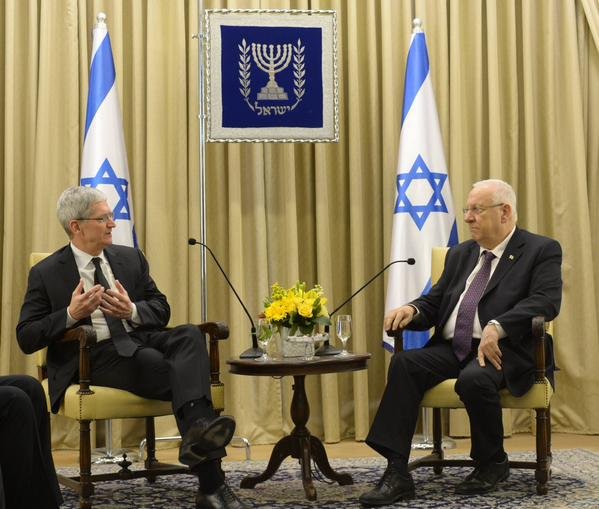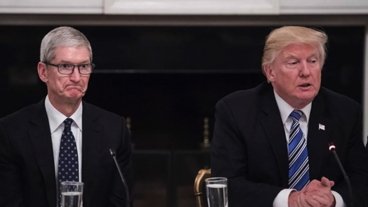Apple Chief Executive Tim Cook was in Israel on Wednesday, and had a meeting with President Reuven Rivlin, as Apple is prepared to open a new office in the country.
There was much speculation for weeks about an impending visit from Cook to Israel, and that was confirmed on Wednesday when the Apple CEO sat down with Israel's president. Photos of a discussion between Cook and Rivlin were shared by Inbal Orpaz.
Cook's appearance coincides with the opening of a new research and development office in Herzliya Pituach, about 20 minutes north of Tel Aviv. The building will house 800 employees who worked for flash memory maker Anobit and motion sensing company PrimeSense, both of which were acquired by Apple.
It's expected that Cook will commemorate the opening of the new offices as part of his visit to the region. The 12,500-square-meter facility will house some 800 workers.
Apple has a significant corporate presence in Israel, with additional research and development sites in Ra'anana and Hafia.
Cook's stop in Israel comes a day after the Apple CEO was in Germany, where he visited the offices of tabloid publication Bild, and also met with some of his company's retail workers. While in Germany, Cook is alleged to have let slip that the upcoming Apple Watch could have greater water resistance than expected, and may be wearable while in the shower.
 Katie Marsal
Katie Marsal








 Marko Zivkovic
Marko Zivkovic
 Mike Wuerthele
Mike Wuerthele
 Malcolm Owen
Malcolm Owen
 Andrew Orr
Andrew Orr

 Christine McKee
Christine McKee
 William Gallagher
William Gallagher
 Chip Loder
Chip Loder







12 Comments
Great move Mr. Cook!!
Good stuff. Work with where the talent is. Israel has a lot of very intelligent, very capable people.
Hope Tim balances it out with a trip to the West Bank - lots of talent there and whats left of Gaza
(flood gate opened)
I just gotta' wonder ... When President [I] Reuven Rivlin [/I] visits Paris -- does he stay at a hotel on the [I] Rue de Rivoli [/I] ;)
[quote name="buckalec" url="/t/184938/apple-ceo-tim-cook-visits-israel-meets-with-president-reuven-rivlin#post_2681054"]Hope Tim balances it out with a trip to the West Bank - lots of talent there and whats left of Gaza (flood gate opened) [/quote] You bring up a good point ... I can remember, in the late 1950s, discussing the conflicts in Ireland and the middle east with co-workers. It seemed that the conflicts had gone on forever -- with each side trying to right wrongs committed, long ago, against their ancestors ... creating new wrongs for their descendants to fight over ... There seemed to be no solution -- and no way for the participants to take peaceful advantage of the benefits of the 20th century. Now, some 60 years later, the situation in Ireland appears to be under control -- and, AFAICT, all benefit from the peaceful environment. It gives me hope that there could be a similar opportunity for the Mideast.